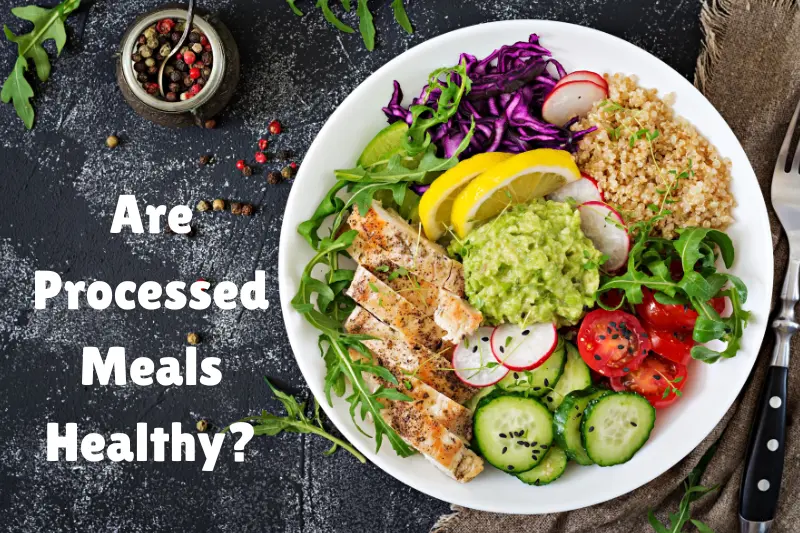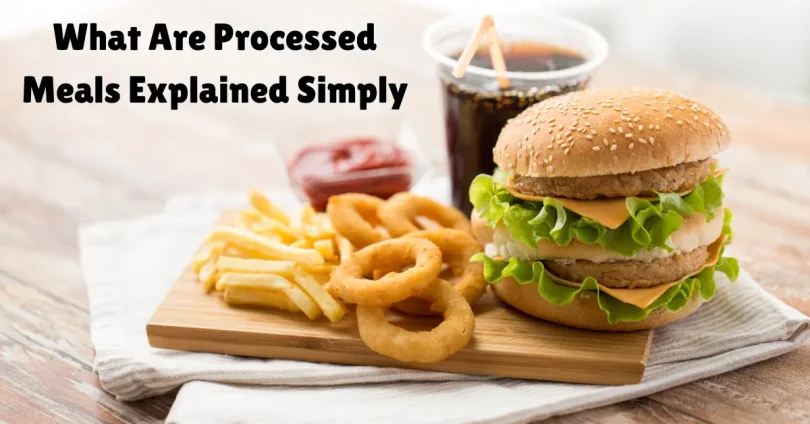Food is an essential part of our lives. Every day, we eat to stay healthy, energized, and satisfied. But if you look closely at the foods on your plate, not everything comes straight from the farm, garden, or kitchen in its natural form. Many items go through a series of changes before they reach you. These are known as processed meals.
If you’ve ever asked yourself, what are processed meals explained simply, this article will help you understand the meaning, examples, types, benefits, risks, and smart choices to make when it comes to processed foods.
What Are Processed Meals Explained Simply?
The word processed means that a food has been changed from its original state before you eat it. These changes can be small or big:
- Small changes – such as freezing, drying, or canning vegetables.
- Big changes – such as turning raw ingredients into instant noodles, packaged snacks, or frozen pizza.
Put simply, processed meals are foods that have been prepared, packaged, or altered in some way to make them last longer, taste better, or become easier to cook and eat.
Common Examples of Processed Meals

To clearly understand what are processed meals explained simply, it helps to see real-life examples. Some common processed meals include:
- Instant noodles
- Frozen pizzas or burgers
- Packaged soups
- Canned beans or vegetables
- Breakfast cereals
- Ready-to-eat microwave dinners
- Chips, cookies, and packaged snacks
Even everyday foods that appear healthy, like bread, cheese, or yogurt, are processed meals because they go through steps such as baking, fermentation, or pasteurization before they reach you.
Levels of Processed Meals
When we talk about what are processed meals explained simply, it’s important to know that not all processed meals are unhealthy. They fall into different categories depending on how much they’ve been changed.
- Minimally processed meals
- These foods go through very small changes like washing, cutting, freezing, or drying.
- Example: frozen fruits, roasted nuts, bagged salads.
- These foods go through very small changes like washing, cutting, freezing, or drying.
- Moderately processed meals
- Extra ingredients such as sugar, oil, or salt are added.
- Example: canned soup, flavored yogurt, packaged bread.
- Extra ingredients such as sugar, oil, or salt are added.
- Highly processed (ultra-processed) meals
- These contain many artificial preservatives, flavorings, sweeteners, or additives.
- They are usually ready-to-eat and heavily packaged.
- Example: instant noodles, packaged cookies, frozen pizza, sodas.
- These contain many artificial preservatives, flavorings, sweeteners, or additives.
You may also like to read this:
How Are Frozen Meals Made In Factories: Complete Guide
16 Common Types of Processed Foods You Eat Daily
Why People Prefer Ready-To-Eat Meals For Busy Lifestyles
13 Best Healthy Alternatives To Processed Meals For Everyone
Why Are Processed Meals Made?
Understanding what are processed meals explained simply also means knowing why they exist. Food companies process meals for several reasons:
- Longer shelf life – Processing prevents food from spoiling quickly.
- Convenience – Ready-to-eat or quick-to-cook meals save time.
- Better taste and texture – Processing makes food look and taste appealing.
- Safety – Methods like pasteurization or canning kill harmful bacteria.
- Cost efficiency – Processed meals are often cheaper to produce and purchase.
Are Processed Meals Healthy?

The health impact of processed meals depends on how much they’ve been changed and what ingredients they contain.
Healthier processed meals include:
- Frozen vegetables (nutrients are preserved).
- Pasteurized milk (kills harmful bacteria).
- Whole-grain bread (adds fiber and nutrients).
- Canned beans (low-sodium options are best).
Less healthy processed meals include:
- Instant noodles (very high in sodium).
- Sugary cereals (loaded with added sugar).
- Packaged cookies, chips, and sodas.
- Frozen fried foods like nuggets or fries.
Eating too many ultra-processed meals can lead to health risks like obesity, diabetes, heart disease, and high blood pressure because they often contain excess sugar, salt, and unhealthy fats.
Tips for Choosing Better Processed Meals
Now that you know what are processed meals explained simply, here are some tips to make healthier choices while still enjoying the convenience:
- Read food labels carefully – check sugar, sodium, and fat levels.
- Choose whole-grain options – like bread, pasta, or cereal.
- Pick frozen or canned vegetables without sauces or added sugar.
- Limit ultra-processed snacks such as sodas, chips, and candy.
- Cook at home when possible – so you control what goes into your meals.
- Balance your diet with fresh fruits, vegetables, and lean proteins.
The Role of Processed Meals in Modern Life
When asking what are processed meals explained simply, it’s also important to recognize how deeply they are connected to our everyday lifestyle. In today’s fast-paced world, people often have less time to cook fresh meals from scratch. That’s why processed meals have become so common—they offer quick, affordable, and accessible solutions.
- Busy professionals rely on microwave dinners or packaged sandwiches during office hours.
- Students often turn to instant noodles or snacks when they lack time or cooking skills.
- Families may keep frozen pizzas or canned goods handy for quick dinners.
This shows that processed meals are not just about convenience—they’ve become a cultural part of how people eat in modern society.
Benefits of Processed Meals
If we look at what are processed meals explained simply, we see that processing food is not always a bad thing. Some benefits include:
- Accessibility – People can enjoy foods that aren’t grown locally, such as tropical fruits or preserved seafood.
- Affordability – Mass production of processed meals often makes them cheaper than fresh alternatives.
- Food safety – Processing techniques like pasteurization, canning, or freezing reduce bacteria and extend shelf life.
- Less waste – Processed meals often last longer, reducing food spoilage in homes.
Risks of Processed Meals
On the flip side, when exploring what are processed meals explained simply, we must also highlight the risks, especially with ultra-processed meals:
- High in unhealthy ingredients – Many processed meals are loaded with sugar, sodium, and unhealthy fats.
- Addictive nature – Artificial flavors and additives make people crave more, leading to overeating.
- Nutrient loss – Heavy processing can strip foods of essential vitamins, fiber, and minerals.
- Chronic health issues – Regularly eating ultra-processed meals increases the risk of obesity, heart disease, and diabetes.
How to Strike a Balance
So, when we answer the question what are processed meals explained simply, the real key is balance. Here’s how you can manage it:
- Choose minimally processed foods more often (frozen vegetables, canned beans, whole-grain bread).
- Limit ultra-processed meals to occasional treats, not daily habits.
- Cook at home whenever possible—homemade meals give you control over ingredients.
- Plan meals in advance so you’re not forced to rely on quick but unhealthy processed options.
Final Thoughts
To wrap up, what are processed meals explained simply means foods that have been altered from their natural state before reaching your plate. These alterations range from simple methods like freezing and canning to more complex processes like making instant noodles or packaged snacks.
Not all processed meals are harmful—some provide safety, convenience, and nutrition—but heavily processed foods can pose health risks if eaten too often. The best way forward is not to avoid them completely but to make informed choices, practice moderation, and balance them with fresh, whole foods.
By understanding what are processed meals explained simply, you gain the power to enjoy modern food conveniences while still protecting your long-term health.
FAQs
1. What are processed meals explained simply in one sentence?
Processed meals are foods that have been changed from their natural state through methods like freezing, canning, cooking, or adding ingredients to make them last longer or taste better.
2. Are all processed meals unhealthy?
No, not all processed meals are unhealthy. Some, like frozen vegetables, canned beans, or pasteurized milk, can be nutritious. The main concern lies with ultra-processed meals such as instant noodles, chips, or sugary cereals.
3. What are some common examples of processed meals?
Examples include instant noodles, frozen pizzas, packaged soups, canned vegetables, chips, cookies, breakfast cereals, and ready-to-eat microwave dinners.
4. Why are processed meals so popular?
They are popular because they are convenient, affordable, have a longer shelf life, and are often easier to prepare than fresh meals.
5. Can I include processed meals in a healthy diet?
Yes, you can. Choosing minimally processed foods like whole-grain bread, plain yogurt, or frozen fruits, and limiting highly processed foods, helps create a healthy balance.





